Related Research Articles

Hunter Stockton Thompson was an American journalist and author who founded the gonzo journalism movement. He rose to prominence with the publication of Hell's Angels (1967), a book for which he spent a year living and riding with the Hells Angels motorcycle club to write a first-hand account of their lives and experiences.
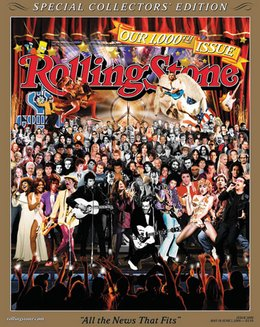
Rolling Stone is an American monthly magazine that focuses on music, politics, and popular culture. It was founded in San Francisco, California, in 1967 by Jann Wenner, and the music critic Ralph J. Gleason. It was first known for its coverage of rock music and political reporting by Hunter S. Thompson. In the 1990s, the magazine broadened and shifted its focus to a younger readership interested in youth-oriented television shows, film actors, and popular music. It has since returned to its traditional mix of content, including music, entertainment, and politics.
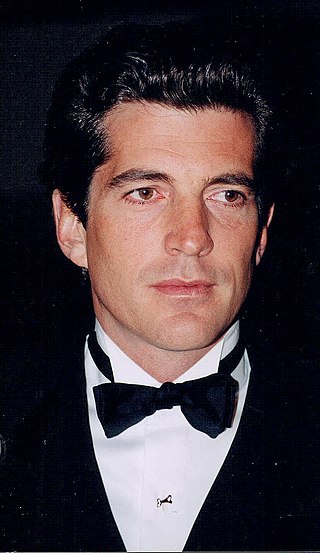
John Fitzgerald Kennedy Jr., often referred to as John-John or JFK Jr., was an American attorney, journalist, and magazine publisher. He was a son of John F. Kennedy, the 35th president of the United States and First Lady Jacqueline Kennedy, and a younger brother of U.S. Ambassador Caroline Kennedy. Three days after his father was assassinated, he rendered a final salute during the funeral procession on his third birthday.

David Halberstam was an American writer, journalist, and historian, known for his work on the Vietnam War, politics, history, the Civil Rights Movement, business, media, American culture, Korean War, and later, sports journalism. He won a Pulitzer Prize for International Reporting in 1964. Halberstam was killed in a car crash in 2007, while doing research for a book.

George Ames Plimpton was an American writer. He is widely known for his sports writing and for helping to found The Paris Review, as well as his patrician demeanor and accent. He was also known for "participatory journalism," including accounts of his active involvement in professional sporting events, acting in a Western, performing a comedy act at Caesars Palace in Las Vegas, and playing with the New York Philharmonic Orchestra and then recording the experience from the point of view of an amateur.
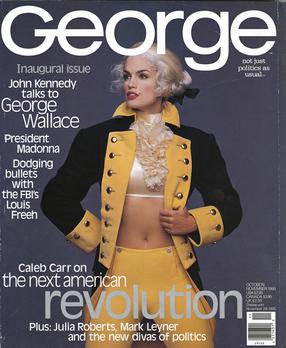
George was a glossy monthly magazine centered on the theme of politics-as-lifestyle founded by John F. Kennedy Jr. and Michael J. Berman with publisher Hachette Filipacchi Media U.S. in New York City in September 1995. Its tagline was "Not Just Politics As Usual." It was published from 1995 to 2001.

David Talbot is an American journalist, author, activist and independent historian. Talbot is known for his books about the "hidden history" of U.S. power and the liberal movements to change America, as well as his public advocacy. He was also the founder and former editor-in-chief of the pioneering web magazine, Salon.
Victor Saul Navasky was an American journalist, editor, and academic. He was publisher emeritus of The Nation and George T. Delacorte Professor Emeritus of Professional Practice in Magazine Journalism at Columbia University. He was editor of The Nation from 1978 until 1995 and its publisher and editorial director from 1995 to 2005. Navasky's book Naming Names (1980) is considered a definitive take on the Hollywood blacklist. For it he won a 1982 National Book Award for Nonfiction.
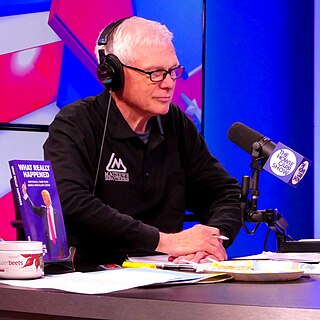
Howard Louis Carr Jr. is an American conservative radio talk-show host, political author, news reporter and award-winning writer.
Dave Marsh is an American music critic, and radio talk show host. He was an early editor of Creem magazine, has written for various publications such as Newsday, The Village Voice, and Rolling Stone, and has published numerous books about music and musicians, mostly focused on rock music. He is also a committee member of the Rock and Roll Hall of Fame.

Richard Lyman Bushman is an American historian and Gouverneur Morris Professor Emeritus of History at Columbia University, having previously taught at Brigham Young University, Harvard University, Boston University, and the University of Delaware. Bushman is the author of Joseph Smith:Rough Stone Rolling, an important biography of Joseph Smith, progenitor of the Latter Day Saint movement. Bushman also was an editor for the Joseph Smith Papers Project and now serves on the national advisory board. Bushman has been called "one of the most important scholars of American religious history" of the late-20th century. In 2012, a $3-million donation to the University of Virginia established the Richard Lyman Bushman Chair of Mormon Studies in his honor.
Martin F. Nolan is an American journalist. A longtime reporter and editor for The Boston Globe, Martin F. Nolan has covered American politics with a distinctive style that deployed allusions from Shakespeare to baseball.
Mark Alan Seliger is an American photographer noted for his portraiture. From 1992 to 2002, he was Chief Photographer for Rolling Stone, during which time he shot over 188 covers for the magazine. From 2002 to 2012 he was under contract with Condé Nast Publications for GQ and Vanity Fair and has shot for numerous other magazines. Seliger has published a number of books, including When They Came to Take My Father: Voices of the Holocaust, Physiognomy, and On Christopher Street: Transgender Stories, and his photographs are included in the permanent collections of the National Portrait Gallery at the Smithsonian Institution, the Museum of Fine Arts in Houston, and the National Portrait Gallery in London. He has done advertising work for Adidas, Amazon, Anheuser-Busch, Apple, Dom Pérignon, Fila, Gap, HBO, Hourglass Cosmetics, Hulu, KITH, Lee Jeans, Levi's, McDonald's, Netflix, Ralph Lauren, Ray-Ban, Rolex, Showtime, Sony, Universal and Viacom, among others. He is also the lead singer of the country band Rusty Truck.

Randall LeRoy Kennedy is an American law professor at Harvard University and author. He is the Michael R. Klein Professor of Law and his research focuses on the intersection of racial conflict and legal institutions in American life. He specializes in contracts, freedom of expression, race relations law, civil rights legislation, and the Supreme Court.
Christopher Peter Andersen is an American journalist and the author of 35 books, including many bestsellers.
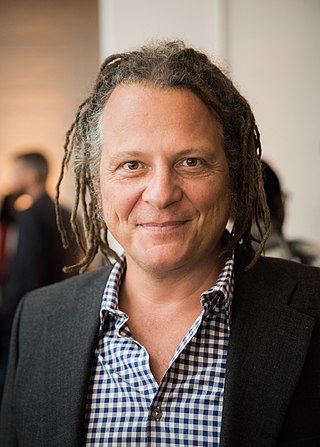
Martin Schoeller is a New York-based photographer whose style of "hyper-detailed close ups" is distinguished by similar treatment of all subjects whether they are celebrities or unknown. His most recognizable work are his portraits, shot with similar lighting, backdrop, and tone. His work appears in "National Geographic Magazine", The New Yorker, "New York Times Magazine", Time, GQ, and Vogue. He has been a staff photographer at The New Yorker since 1999.

Chronicles: Volume One is a memoir written by American musician Bob Dylan. The book was published on October 5, 2004, by Simon & Schuster.

Will Hermes is an American author, broadcaster, journalist and critic who has written extensively about popular music. He is a longtime contributor to Rolling Stone and to National Public Radio's All Things Considered. His work has also appeared in Spin, The New York Times, The Village Voice, The Believer, GQ, Salon, Entertainment Weekly, Details, City Pages, The Windy City Times, and Option. He is the author of Love Goes To Buildings On Fire: Five Years in New York That Changed Music Forever (2011), a history of the New York City music scene in the 1970s.

"A Rape on Campus" is a retracted, defamatory Rolling Stone magazine article written by Sabrina Erdely and originally published on November 19, 2014, that describes a purported group sexual assault at the University of Virginia (UVA) in Charlottesville, Virginia. Rolling Stone retracted the story in its entirety on April 5, 2015. The article claimed that a UVA student Jackie Coakley had been taken to a party hosted by UVA's Phi Kappa Psi fraternity by a fellow student. At the party, Jackie alleged in the article, her date led her to a bedroom where she was gang raped by several fraternity members as part of a fraternity initiation ritual.
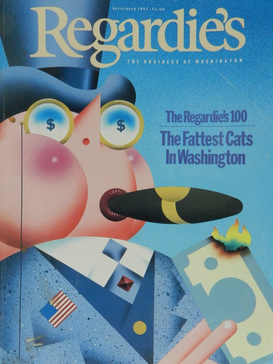
Regardie's (1980–1992) was a Washington, D.C. business magazine that was published from 1980 through 1992. It was distinguished by its quirky nature, but was also able to boast about breaking a number of significant financial stories such as a 1990 story on First American Bank and the Bank of Credit and Commerce International.
References
- ↑ David Carr (February 17, 2005). "Amid the Firestorm, a Portrait of Harvard". The New York Times . Retrieved January 12, 2015.
Even his name, Richard Bradley, seems perfectly chosen, as it was. Mr. Bradley was born Richard Blow in 1964. But before publishing "Harvard Rules," he decided to adopt his mother's maiden name. In doing so, he may lose some of the baggage his birth name carried, particularly after he disavowed a confidentiality agreement to write a hagiographic book about Mr. Kennedy, for whom he had worked at George magazine.
- ↑ Carr, David (17 February 2005). "Amid the Firestorm, a Portrait of Harvard". The New York Times.
- ↑ "Writing on John F. Kennedy Jr". The New York Times. 10 November 2002.
- ↑ Carr, David (17 February 2005). Amid the Firestorm, a Portrait of Harvard, The New York Times
- ↑ Bradley, Richard (March 2005). Harvard Rules: The Struggle for the Soul of the World's Most Powerful University. ISBN 0060568542.
- ↑ Nowlin, Bill. The game that put a Dent in Sox fans' dreams, Boston Globe
- ↑ Reider, Abigail (25 February 2005). Bradley ’86 predicted Summers maelstrom, Yale Daily News
- ↑ Miley, Marissa (15 April 2009). Worth Relaunches as Even More Exclusive Title for Ultra-Rich, Ad Age
- ↑ McCoy, Terrence (8 December 2014). The initial response to Bradley's post on his personal blog, "Is the Rolling Stone Story True?," was an angry backlash; writing on the website Jezebel, Anna Merlan called him an "idiot" who "didn't know what he was talking about." When the Rolling Stone story was subsequently shown to be false, Merlan admitted that she had been "dead fucking wrong." The epic Rolling Stone gang-rape fallout — and how major publications get it wrong, The Washington Post
- ↑ Bradley, Richard (24 November 2014). Is the Rolling Stone Story True?, RichardBradley.net